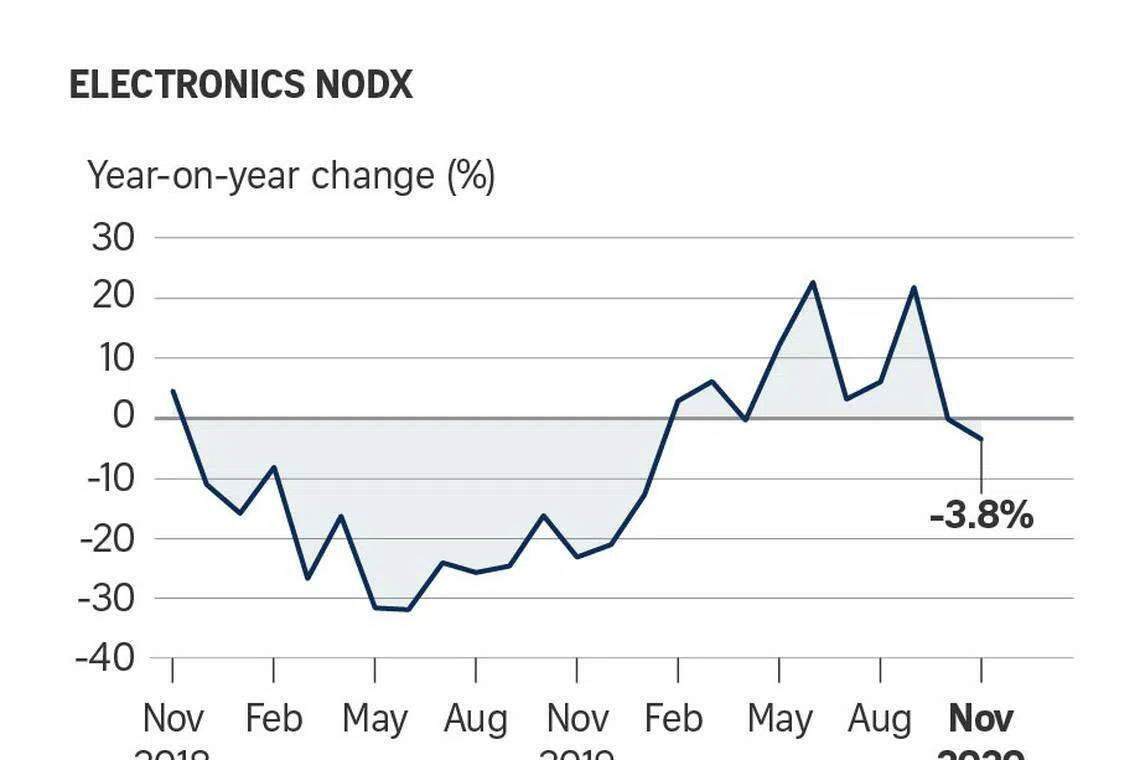Singapore non-oil exports drop for second straight month in November with 4.9% fall

SINGAPORE exports failed to gain ground in November, on a broad-based slump.
Non-oil domestic exports (NODX) fell by 4.9 per cent year on year, in the second month of decline, according to trade agency Enterprise Singapore (ESG) on Thursday.
This was worse than the median estimate of 0.3 per cent growth in a private poll by Bloomberg, and extended the decrease of 3.1 per cent in October.
Shipments in the linchpin electronics cluster dropped by 3.8 per cent, weighed down by integrated circuits, after contracting by 0.5 per cent in the month before.
Meanwhile, non-electronics NODX shrank by 5.2 per cent, continuing October's 4 per cent decline, as pharmaceuticals and petrochemicals remained sluggish.
Petrochemicals exports shed 18.5 per cent, which ESG attributed to "generally subdued demand", while the volatile pharmaceuticals industry lost 13.4 per cent.
SEE ALSO
GET BT IN YOUR INBOX DAILY

Start and end each day with the latest news stories and analyses delivered straight to your inbox.
Shipments of non-monetary gold, a safe-haven asset that had fuelled export growth in the earlier part of the year, slid by 15.1 per cent. ESG said the decline in the last two months was on gold prices coming down from August's peak, as well as improved sentiment from Covid-19 vaccine developments and green shoots in the United States.
But Barclays economist Brian Tan noted that November's NODX fall "was not due to shipments of non-monetary gold", as exports rose to S$0.9 billion from S$0.3 billion in October. Instead, the deepening decline came on an unfavourable base effect and weaker-than-expected electronics and pharmaceuticals, he said.
Singapore's combined NODX to its top markets was down year on year in November - dragged down by mainland China, the European Union and Indonesia - despite growth in exports to the US, Japan, Taiwan, Malaysia, Thailand and Hong Kong.
Meanwhile, exports to emerging markets slipped by 3.9 per cent, easing from the 12.1 per cent fall in October, on shrinking shipments to the Middle East, Cambodia, Laos, Myanmar, Vietnam and Central Asia.
Still, on a seasonally-adjusted, month-on-month basis, NODX rose by 3.8 per cent to S$13.6 billion, compared with a decrease of 5.4 per cent in the month before.
Overall, total trade decreased by 8.7 per cent year on year in November, after falling by 9 per cent in October, as the oil trade remained contractionary on lower prices.
Mr Tan warned: "The NODX data suggest manufacturing activity lost some steam in Q4. As a result, we note the risk that the economy contracts by more than the 5.5 per cent we expect for the full year 2020."
Still, JPMorgan economic and policy research analyst Ong Sin Beng said that NODX seems to be stabilising, after weakness in recent months.
"The monthly ebb and flow of Singapore's NODX tends to be noisy, due in part to the volatility in pharmaceuticals," he said in a note.
"However, in trend terms, the view remains that the underlying recovery in goods demand should continue though mixed in with periodic volatility and underpins our view of a gradual recovery through next year," Mr Ong added.
ESG most recently forecast full-year NODX growth of between 4 per cent and 4.5 per cent in 2020, before moderating to between zero and 2 per cent in 2021.

KEYWORDS IN THIS ARTICLE
BT is now on Telegram!
For daily updates on weekdays and specially selected content for the weekend. Subscribe to t.me/BizTimes
Economy & Policy
Former transport minister Iswaran seeks clarity on prosecutors’ handling of his criminal case
Trade between Singapore and Asean was at S$295.6 billion in 2023
AI lacks judgement to set interest rates, MAS chief says
Iras to claw back S$60 million from buyers who used ‘99-to-1’ loophole to avoid ABSD
Daily Debrief: What Happened Today (May 7)
Two men convicted in S$3 billion money laundering case deported to Cambodia
